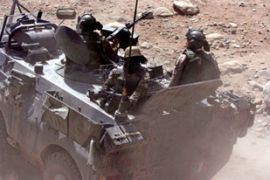Nato urged greater Afghan role
Commanders say that forces fighting the Taliban need more soldiers and equipment.

| In video | ||||
Fighting to reconstruct Helmand province
|
Robert Gates, the US defence secretary, on Monday accused allies of not living up to past promises on troops, equipment and army trainers, setting the tone for what could be fraught talks.
“The secretary does not seek to single out or embarrass any one nation but remind this powerful alliance of their moral responsibility and collective commitments made at Riga,” Geoff Morrell, a Pentagon press secretary, said.
At a summit in Latvia last year, Nato leaders pledged to ensure success in Afghanistan, and Washington considers an increased commitment in manpower and equipment vital to achieve this.
Under strength
Nato commanders have complained that the International Security Assistance Force (Isaf) in Afghanistan is about 10 per cent under strength, with helicopters, airlift capability and manpower shortages particularly acute.
| “If we do not prevail, consequences for the public in Europe will be dire” Jaap de Hoop Scheffer, Nato secretary-general |
While the Czech Republic and Slovakia announced ahead of Wednesday’s meeting that they would deploy an extra 160 troops, Britain and Denmark moved to deny suggestions they were preparing to send reinforcements.
Nato members have complained that they are overstretched due to other commitments, including Iraq, Kosovo and Lebanon.
Even the host of the conference, the Netherlands, is considering withdrawing its 1,600 personnel and Japan recently proposed halting its naval operations in support of the mission.
Al Jazeera’s Hamish McDonald in Kabul said that heavy casualties among troops from Canada and the Netherlands were turning public opinion against continued deployment in Afghanistan.
“Clearly if these kind of attacks continue the Taliban knows that they can inflict fairly heavy psychological damage on those militaries, and also the countries where those forces come from, and potentially force withdrawals,” he said.
‘Difficult phase’
However, Jaap de Hoop Scheffer, Nato secretary-general, has said the need for reinforcements is greater than ever during what he called the “most difficult phase” in Afghanistan.
“If we do not prevail, consequences for the public in Europe will be dire,” he said.
Fighting has increased in southern Afghanistan over the past two years, leaving about 7,000 dead across the country. It is the bloodiest period since the Taliban movement was forced from power after a US-led invasion in late 2001.

